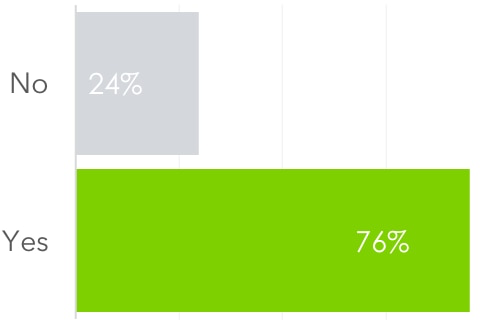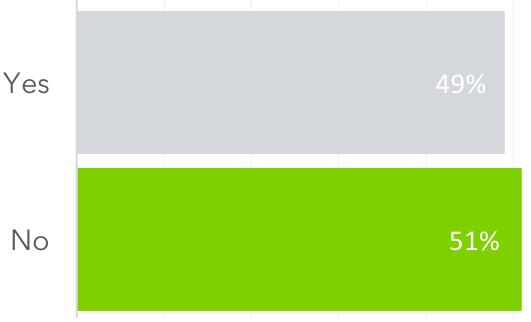For small business owners, few milestones are as significant as hiring that first employee. It's a big step. After months or likely even years of carrying all the responsibility and doing all the hard work, suddenly there's someone new on the scene---a second in command, so to speak---who can shoulder some of those burdens and offer a new perspective. Understandably, the person in that position needs to be someone you trust. In an effort to better understand this relationship and the mechanics behind that first hiring decision, QuickBooks Payroll surveyed 400 small business owners who employ 20 or fewer employees. Survey respondents were asked about everything from where they found their first hire to whether that first employee is still around. Check out our summary below to see what they said.
Small Business Recruitment Survey 2018
3 out of 4 first hires are still with their companies today
Most employees crave a sense of responsibility and fulfillment or, at the very least, a feeling that what they do is important to the overall success of the mission. First hires inherently experience these feelings of responsibility, as they tend to know better than anyone how much work goes into running the business and what sacrifices must be made to keep the wheels turning. Like business owners, first hires are often personally invested in the company's success. Perhaps it's this, then, that prompts so many of them to stay. In fact, according to survey results, 76 percent of first hires are still with their companies today.
Is your first employee still employed by your company?
 Something many employees likely don't realize is how many employers pay their first hire more than they pay themselves. In fact, nearly 1 in 2 business owners (49 percent) said their first employee received a higher paycheck than they did. The same number also said they used special incentives to bring on that first hire. Most business owners (71 percent) said their first hires were paid hourly, though only 51 percent were paid overtime.
Something many employees likely don't realize is how many employers pay their first hire more than they pay themselves. In fact, nearly 1 in 2 business owners (49 percent) said their first employee received a higher paycheck than they did. The same number also said they used special incentives to bring on that first hire. Most business owners (71 percent) said their first hires were paid hourly, though only 51 percent were paid overtime.
Did you pay your first employee more than you paid yourself?
 As for the hiring itself, perhaps it's a testament to how great that first hire was, but 72 percent of respondents said they thought it would be harder to hire a good first employee today. That's interesting, given the wide range of search options available to employees and employers alike, helping companies connect with qualified job applicants. When asked where they go to find employees, small business owners listed LinkedIn as their best recruitment tool, followed by recruitment agencies and, strangely enough for the age of technology, newspaper ads. Word of mouth was lowest on the list, implying business owners would rather leave hiring to the professionals than ask friends or family for recommendations.
As for the hiring itself, perhaps it's a testament to how great that first hire was, but 72 percent of respondents said they thought it would be harder to hire a good first employee today. That's interesting, given the wide range of search options available to employees and employers alike, helping companies connect with qualified job applicants. When asked where they go to find employees, small business owners listed LinkedIn as their best recruitment tool, followed by recruitment agencies and, strangely enough for the age of technology, newspaper ads. Word of mouth was lowest on the list, implying business owners would rather leave hiring to the professionals than ask friends or family for recommendations.
What's been your best recruitment tool (with 1 being best, 7 worst)?
- LinkedIn
- Recruitment agencies
- Newspaper ads
- Recruitment websites (e.g. Monster, SimplyHired)
- Online marketplaces (e.g. Craigslist)
- Social media
- Word of mouth/referrals
It's interesting that recruitment agencies rank second, particularly given the cost associated with such services. Companies typically pay more money for an individual contracted with a recruitment agency, because the agency is paid a percentage of the worker's salary, and the worker must take home a competitive rate. According to Barbara Ashton, president and founder of the recruiting agency Ashton & Associates Recruiting, most recruiting fees run between 15 and 20 percent of the candidate's total first-year earnings, at an average of 21 percent. In contrast, hiring your sister's next-door neighbor who just happens to know a thing or two about the role you're hiring for costs nothing. So why don't more business owners rely on word of mouth? It's possible some employers do rely on word of mouth, just not when it comes to those first few essential hires. This could have to do with the high level of expertise being sought out. Presumably, business owners want to hire people who know more than they do about certain areas of their business, and they think no one they know is in contact with a professional fitting those exact skills. Business owners could also be looking to bring more diversity to the workplace and might think friends of friends are unlikely to be in different cultural, educational or economic social circles than themselves. Regardless of how they found their first hire, a large percentage of business owners said their first employee was brought on as a jack of all trades. In fact, 29 percent said their first hire did a bit of everything, followed by 12 percent who answered sales and 11 percent who said customer service.
When you hired your first employee, what work did you primarily hire them to do?

Key takeaways
Most small business owners know they don't have all the necessary skills, or even the time, to take care of all the moving parts that keep a small business afloat. Keeping track of tasks like accounting, business development or even administration might be best left to a trusted employee---perhaps even their first hire. And the good news for them is most first hires stick around for the long haul. This article was originally shared here and republished with permission from the author.